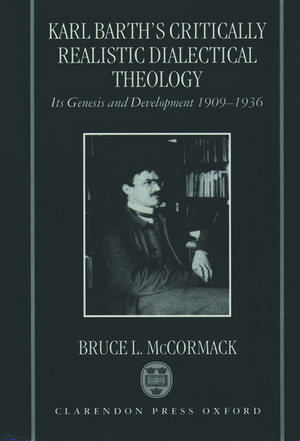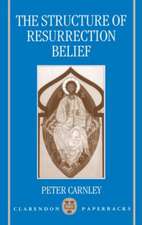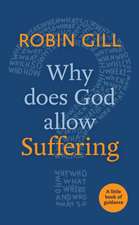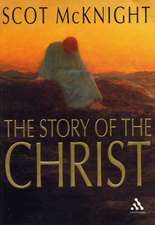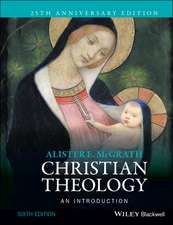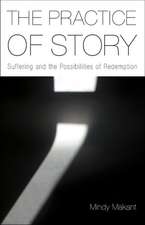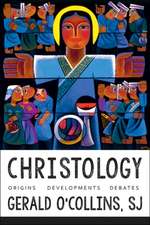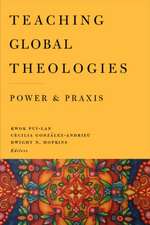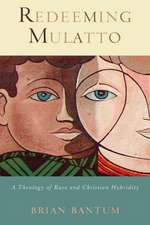Karl Barth's Critically Realistic Dialectical Theology: Its Genesis and Development 1909-1936
Autor Bruce L. McCormacken Limba Engleză Paperback – 5 mar 1997
Preț: 746.81 lei
Preț vechi: 1130.71 lei
-34% Nou
Puncte Express: 1120
Preț estimativ în valută:
142.97€ • 147.03$ • 118.61£
142.97€ • 147.03$ • 118.61£
Carte tipărită la comandă
Livrare economică 06-12 februarie
Preluare comenzi: 021 569.72.76
Specificații
ISBN-13: 9780198269564
ISBN-10: 0198269560
Pagini: 520
Dimensiuni: 138 x 216 x 28 mm
Greutate: 0.65 kg
Ediția:Revised
Editura: OUP OXFORD
Colecția OUP Oxford
Locul publicării:Oxford, United Kingdom
ISBN-10: 0198269560
Pagini: 520
Dimensiuni: 138 x 216 x 28 mm
Greutate: 0.65 kg
Ediția:Revised
Editura: OUP OXFORD
Colecția OUP Oxford
Locul publicării:Oxford, United Kingdom
Recenzii
This is an extraordinarily important volume for understanding the premier protestant theologian of the 20th century...the book is noteworthy for its thorough treatment of Barth's early break with liberalism and the developments leading up to it, and its full account of the neglected first edition of the Romans commentary, which has never been translated into English.
In this expanded version of his Princeton Seminary dissertation.. McCormack has surely provided a benchmark for any future discussion of Barth's theological development...The importance of this formidable, richly documented study goes far beyond the cogency of the thesis, which I must leave for the Barth experts to assess...One of the most valuable features of McCormack's study is the care with which he portrays Barth's relation to his teacher Wilhelm Herrmann...marvellously rich volume.
a magnificent book, quite the most brilliant treatment of Barth's theology and its movement towards maturity that I have ever read ... the best study of any one twentieth-century theologian that I think has been written in English. One can only marvel at the breadth of knowledge and understanding it contains, and the sheer expository skill to be able to communicate it as well as McCormack does ... what marks out McCormack's work here is the sheer effort expended in analysing that first edition, in quarrying its tortuous and arcane themes and variations, and in revealing their underlying structure. I can do nothing but commend McCormack's book to everyone who might read this review ... will be compulsory reading for all my students of modern theology ... On this evidence, one hopes that it will not be too long before Bruce McCormack begins producing his own constructive theology.
His study is simply the best intellectual biography of Barth now available, and it is as brilliant as it is unorthodox.
This ground-breaking study intensifies a provocative controversy concerning the genesis, development, and character of Barth's theological thought ... McCormack's overall contention is pertinent and persuasive, particularly his stress on the overarching continuity and consistency in Barth's theological concerns and interests ... McCormack's main thesis is cogent and persuasive and this book is now an essential text for anyone who wishes to examine Barth's theological development from the early period of Marburg to the period of his mature thought presented in the Church Dogmatics.
Significant book ... McCormack's book is a masterful achievement. Beautifully written and well-researched, it is a seminal study of one of this century's most important religious thinkers and reads like an intellectual Baedeker of the ground-breaking cultural and political movements in Weimar Germany that shaped Barth's early theology. Alternately a book in Barth scholarship and early-twenthieth-century theology and culture, the book will appeal to specialists and general readers alike.
One of the most significant studies of Barth, within the English-speaking world, to emerge for a generation...No-one who wishes to engage with Barth and with Reformed theology can afford to ignore this book which will quickly establish itself as required reading for those so interested.
This is a delightful book which tries to solve the puzzle of Nicomachean Ethics 5.5.
It is sure to be of immense usefulness to Barth scholars, challenging and illumining them.
the best comprehensive interpretation of Karl Barth's theology in years. It is the best historical and genetic reconstruction of Karl Barth's theology available so far in English, and I should say even in German ... McCormack's reading is very faithful and his reconstruction very convincing. His will be a lasting interpretation of Barth's theology and a basic required reading for any serious study of Barth in the future. ... his rigorous scholarly achievement has moved the Barth-research onto a qualitative level we dare not fail to achieve, even as we attempt to go beyond it. For this service we are all deeply indebted to McCormack's labor of love.
A deep and substantial interpretation of Barth's theological development up to the early volumes of the Church Dogmatics... new interpretative insight... McCormack introduces a real advance in understanding in Barth here, and in particular his modernity... McCormack's book undoubtedly becomes the major English speaking text for Barth interpretation... The book is well written and will interest not only Barth scholars but will hold the attention of those with a great interest in the twentieth century's greatest theologian.
In this expanded version of his Princeton Seminary dissertation.. McCormack has surely provided a benchmark for any future discussion of Barth's theological development...The importance of this formidable, richly documented study goes far beyond the cogency of the thesis, which I must leave for the Barth experts to assess...One of the most valuable features of McCormack's study is the care with which he portrays Barth's relation to his teacher Wilhelm Herrmann...marvellously rich volume.
a magnificent book, quite the most brilliant treatment of Barth's theology and its movement towards maturity that I have ever read ... the best study of any one twentieth-century theologian that I think has been written in English. One can only marvel at the breadth of knowledge and understanding it contains, and the sheer expository skill to be able to communicate it as well as McCormack does ... what marks out McCormack's work here is the sheer effort expended in analysing that first edition, in quarrying its tortuous and arcane themes and variations, and in revealing their underlying structure. I can do nothing but commend McCormack's book to everyone who might read this review ... will be compulsory reading for all my students of modern theology ... On this evidence, one hopes that it will not be too long before Bruce McCormack begins producing his own constructive theology.
His study is simply the best intellectual biography of Barth now available, and it is as brilliant as it is unorthodox.
This ground-breaking study intensifies a provocative controversy concerning the genesis, development, and character of Barth's theological thought ... McCormack's overall contention is pertinent and persuasive, particularly his stress on the overarching continuity and consistency in Barth's theological concerns and interests ... McCormack's main thesis is cogent and persuasive and this book is now an essential text for anyone who wishes to examine Barth's theological development from the early period of Marburg to the period of his mature thought presented in the Church Dogmatics.
Significant book ... McCormack's book is a masterful achievement. Beautifully written and well-researched, it is a seminal study of one of this century's most important religious thinkers and reads like an intellectual Baedeker of the ground-breaking cultural and political movements in Weimar Germany that shaped Barth's early theology. Alternately a book in Barth scholarship and early-twenthieth-century theology and culture, the book will appeal to specialists and general readers alike.
One of the most significant studies of Barth, within the English-speaking world, to emerge for a generation...No-one who wishes to engage with Barth and with Reformed theology can afford to ignore this book which will quickly establish itself as required reading for those so interested.
This is a delightful book which tries to solve the puzzle of Nicomachean Ethics 5.5.
It is sure to be of immense usefulness to Barth scholars, challenging and illumining them.
the best comprehensive interpretation of Karl Barth's theology in years. It is the best historical and genetic reconstruction of Karl Barth's theology available so far in English, and I should say even in German ... McCormack's reading is very faithful and his reconstruction very convincing. His will be a lasting interpretation of Barth's theology and a basic required reading for any serious study of Barth in the future. ... his rigorous scholarly achievement has moved the Barth-research onto a qualitative level we dare not fail to achieve, even as we attempt to go beyond it. For this service we are all deeply indebted to McCormack's labor of love.
A deep and substantial interpretation of Barth's theological development up to the early volumes of the Church Dogmatics... new interpretative insight... McCormack introduces a real advance in understanding in Barth here, and in particular his modernity... McCormack's book undoubtedly becomes the major English speaking text for Barth interpretation... The book is well written and will interest not only Barth scholars but will hold the attention of those with a great interest in the twentieth century's greatest theologian.
